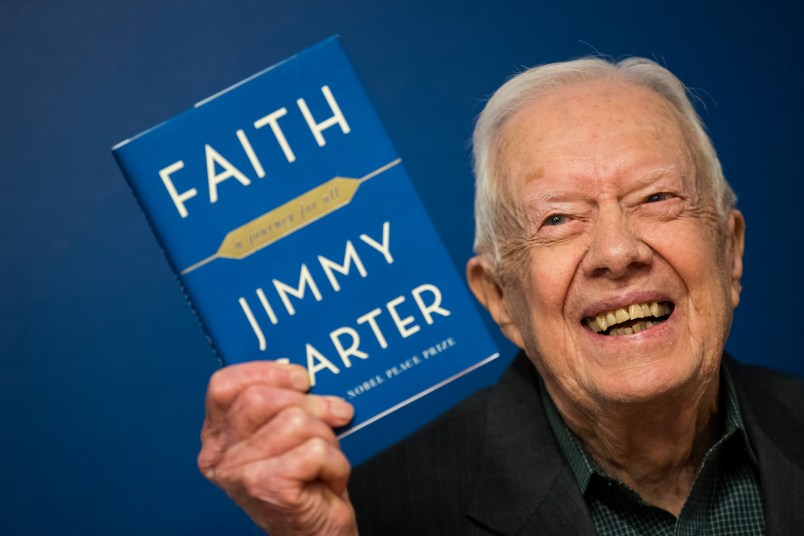ATLANTA (AP) — Former President Jimmy Carter sees little hope for the U.S. to change its human rights and environmental policies as long as Donald Trump is in the White House, but he has a warning for his fellow Democrats looking to oust the current administration: Don’t go too far to the left.
“Independents need to know they can invest their vote in the Democratic Party,” Carter said Tuesday during his annual report at his post-presidential center and library in Atlanta, where he offered caution about the political consequences should Democrats “move to a very liberal program, like universal health care.”
That’s delicate — and, Carter acknowledged, even contradictory — advice coming from the 93-year-old former president, and it underscores the complicated political calculations for Democrats as they prepare for the November midterms and look ahead to the 2020 presidential election.
“Rosie and I voted for Bernie Sanders in the past,” Carter noted.
He was referring to his wife, Rosalynn, and their support for the Vermont senator, an independent who identifies as a democratic socialist, over establishment favorite Hillary Clinton in the 2016 Democratic presidential primary. At another point, he pointed to California’s environmental policies — limits on carbon emissions, stiffer fuel-efficiency standards — as the model for combating climate change.
Still, Carter stressed, Democrats nationally must “appeal to independents” who are souring on the current administration.
Trump’s job approval rating, according to Gallup, has dipped to 40 percent, mostly because of declining support among independents.
Carter alluded to arguments from self-identified progressives that Democrats will sacrifice votes on the left if they don’t embrace the liberal base: “I don’t think any Democrat is going to vote against a Democratic nominee,” and he insisted that he’s not asking the left to sacrifice its goals, only to see that winning elections is necessary to accomplish any of them.
There is some historical irony in Carter’s analysis. He came to the White House in 1976 from the moderate wing of the Democratic Party, and he clashed with party liberals, drawing a spirited primary challenge in 1980 from Massachusetts Sen. Ted Kennedy. Carter prevailed, but he was wounded, abandoned by Kennedy’s most liberal supporters and unable to win over independents who helped deliver a landslide for Republican Ronald Reagan.
Carter’s latest handicapping comes near the conclusion of a midterm primary season that has seen Democratic primary voters move the party to the left.
In some states and districts, that means nominating full-throated advocates of single-payer health care, a $15 minimum wage and abolishing or at least overhauling the federal Immigration and Customs Enforcement agency. In other races, it means nominees who back more cautious moves to the left, such as background checks before certain gun purchases, a “public option” health insurance plan to compete alongside private insurance policies, step raises for the minimum wage and an immigration overhaul that offers legal status to some immigrants in the country illegally.
Carter did not delve into those distinctions, instead offering a sweeping condemnation of his latest successor to remind Democrats of the stakes.
He denounced the administration’s latest environmental policy proposal to make it easier for energy companies to release methane gas that contributes to climate change. He singled out Trump’s policy of separating immigrant families at the border, including those seeking asylum.
“America is inherently committed to human rights, and I think in the future we will let that prevail,” Carter said, “but for the next two years, I can’t predict the imprisoned children are going to be any better off — unfortunately.”
Carter has previously criticized Trump for his repeated falsehoods, and he’s chided Trump for his hardline support for Israel over Palestinians. Yet Carter has found common ground with Trump on other foreign policy fronts, and did so again Tuesday.
While avoiding any mention of the special counsel’s investigation into whether Trump’s presidential campaign coordinated with Russia in the 2016 U.S. election, Carter said he has engaged for years with Russian President Vladimir Putin concerning the ongoing Syrian civil war.
“I have his email address,” Carter said, adding that he and Putin share the same Russian river as their favorite spot for salmon fishing. That friendship, Carter said, means when Russia and other nations hold multilateral talks about the Syrian conflict, “Quite often they invite the Carter Center. … They do not invite the U.S. government.”
Carter also praised Trump for meeting with North Korean leader Kim Jong Un. Carter repeated his frustrations with the last Democratic president, Barack Obama, for not engaging more directly with the insular Asian nation. Carter said he’s not sure Trump has made real progress yet with North Korea, but he endorsed calls for the U.S. to formally declare an end to the Korean War and normalize relations with Pyongyang.
“Let them be part of the community of nations,” he said. “I think that would be enough in itself to bring an end to the nuclear program in North Korea.”







Thank you for your wise counsel, Mr. President…
The Republicans took the White House, the Senate, and the House with a message that didn’t have a hint of moderation in it. Jus’ sayin’.
no reason/‘waiting’
Where on the political spectrum do actual good policy ideas lie?